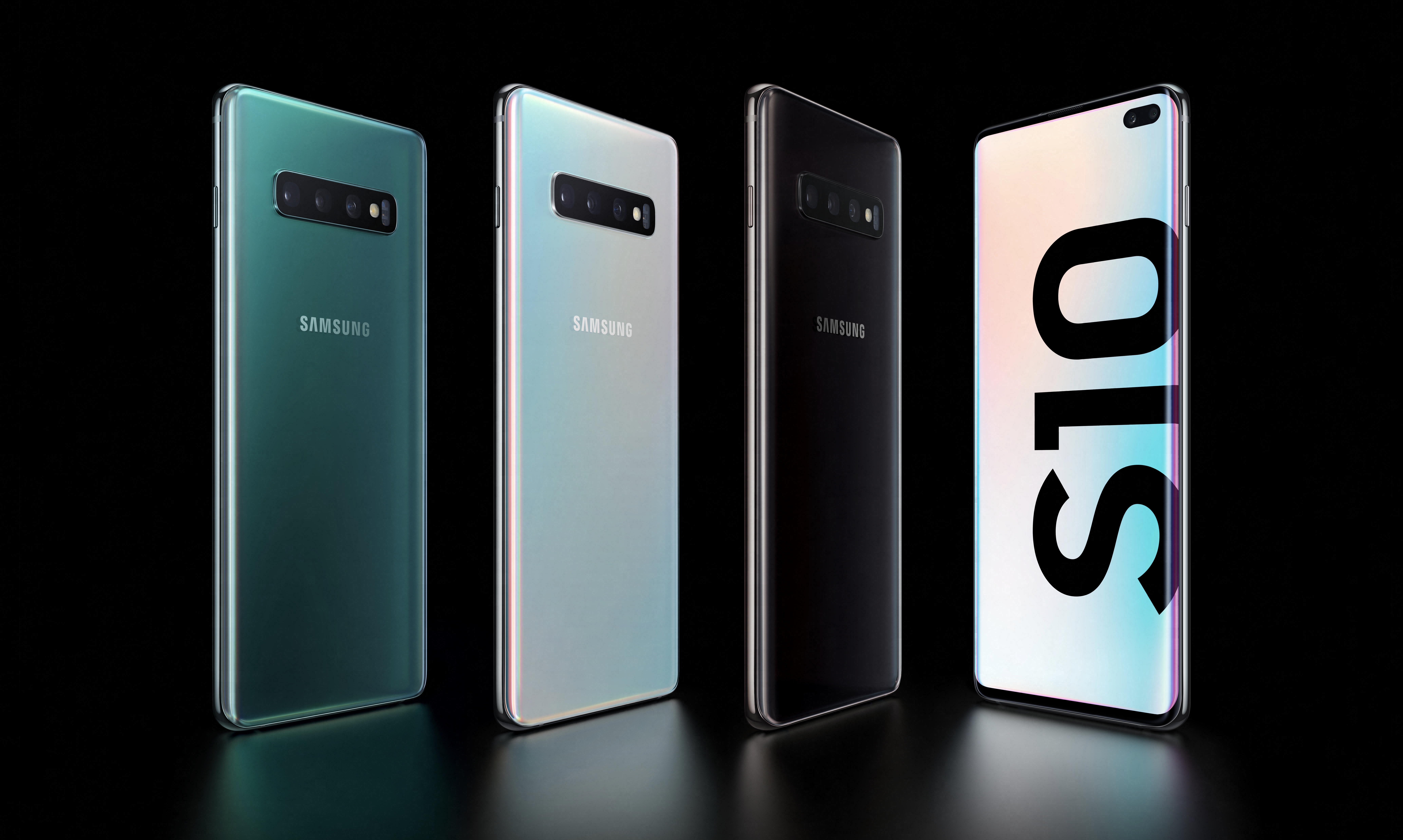Samsung just delivered a keynote packed with new devices, including an all-new Galaxy S10 lineup and the exciting Galaxy Flex, its first foldable smartphone. But are any of them worth considering for an iPhone fan?
We’ve compared all four of Samsung’s new devices with the iPhone XS, XS Max, and XR to see how they stack up. Whether you want the best display, cameras, security, or performance, we can help you choose the right phone for you.
Galaxy S10 vs. iPhone
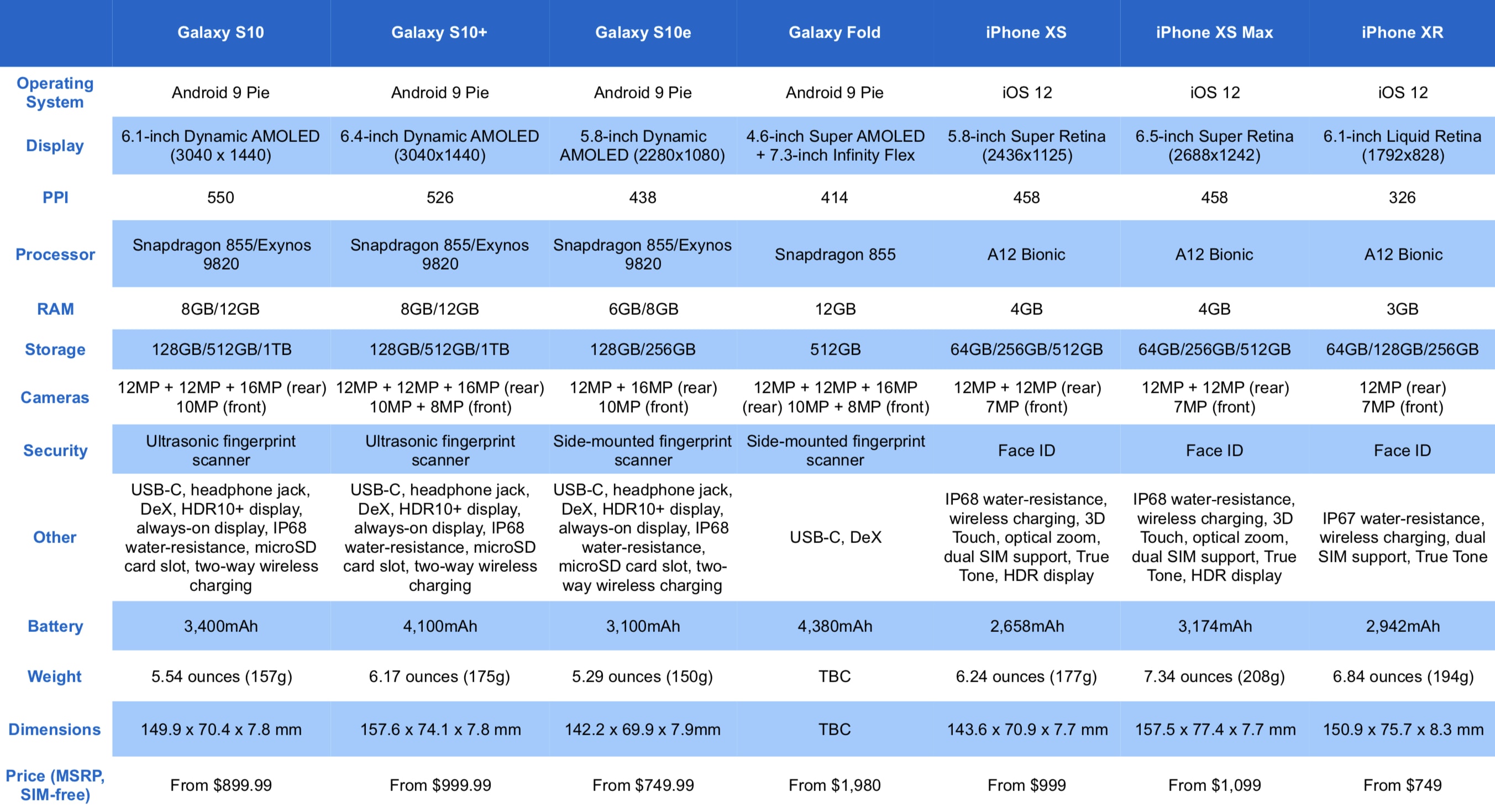
Table: Cult of Mac
Dazzling displays
Samsung manufactures some of the best smartphone displays you’ll see on the market today, and six of these phones are carrying them. The iPhone XS, iPhone XS Max, and obviously all of the new Galaxy devices have Samsung OLED screens.
They’re all super-sharp, edge-to-edge, and brilliantly beautiful. They boast vibrant colors, excellent brightness, and incredible contrast ratios. They might just be the best screens you’ll see anywhere. In fact, Samsung is sure it’s can’t be beaten.
Its new Dynamic AMOLED displays boast 2 million-to-1 contrast ratios, and they’re the first to receive HDR10+ certification. In comparison, the iPhone XS and XS Max support older HDR10 and have 1 million-to-1 contrast ratios.
But there are other big differences, too.
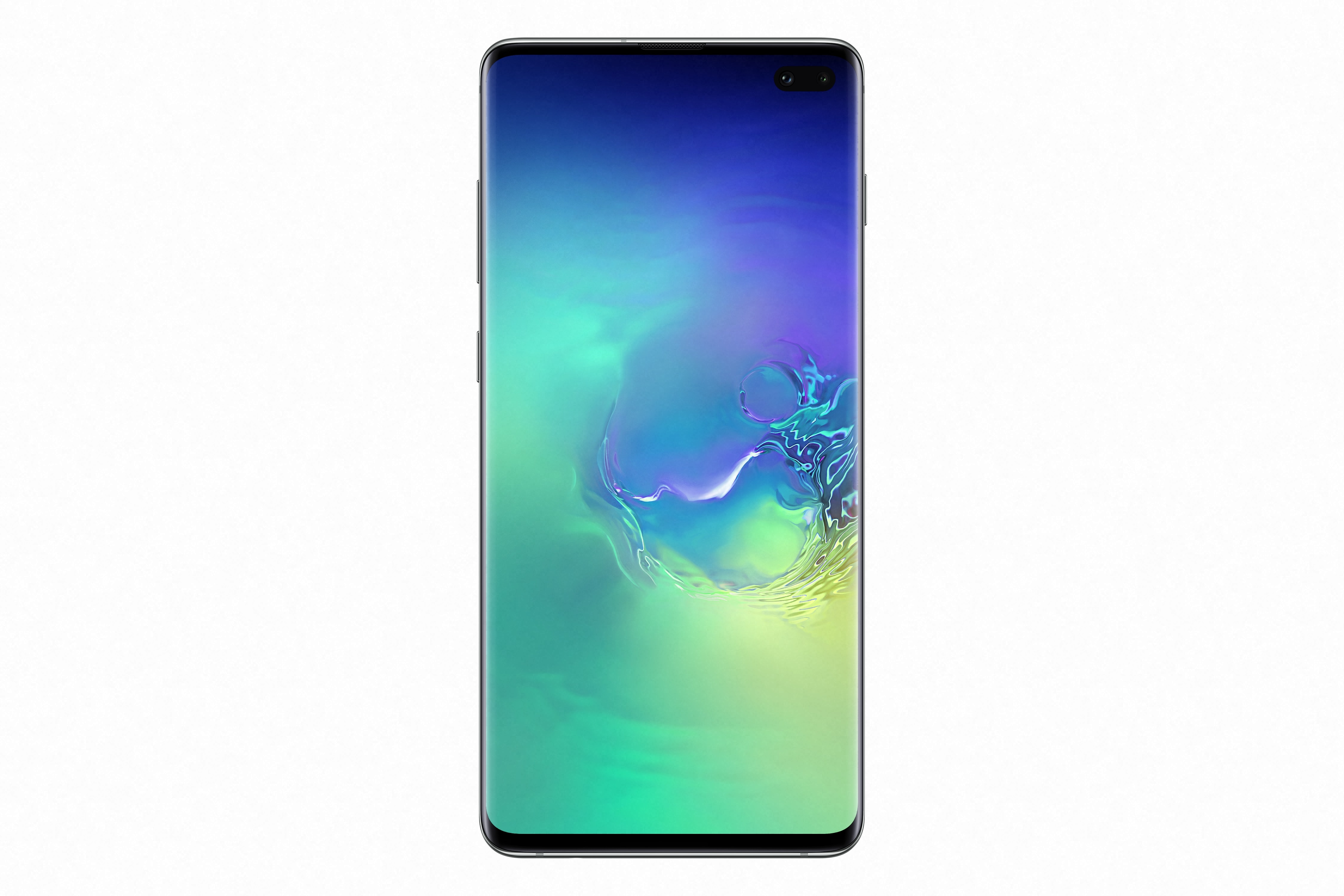
Photo: Samsung
Samsung is known for turning up the saturation on its screens so that bright colors have a little more pop. It’s great if you like that look, but it does mean that iPhone screens tend to be more color accurate out of the box. That may not be the case with the Galaxy S10 lineup, however.
Samsung says its new screens are the most color accurate displays you’ll see on a mobile device. Plus, it usually gives you the option to tone down display saturation in its software — we’re assuming it will do the same with its new Galaxies — whereas you’re stuck with the setting Apple decided on with the iPhone.
Apple makes up for that by giving us True Tone, which adjusts color temperature based on the ambient light around you. It’s an excellent addition, and once you’re used to it, displays without True Tone just aren’t as easy on the eyes.
Noticeable notches
The other big difference here is in the notches: The latest iPhone lineup carries the same notch as the iPhone X. It’s not too thick, but it is long, leaving only a little room either side. The new Galaxy lineup employs much smaller cutouts.
That means Samsung’s new devices will eat into your content less than the iPhones do. Their displays won’t get in the way quite as much when you’re browsing the web, watching videos, or playing games.
The iPhone XR is at a big disadvantage in the display category. Its display, although good enough, is nowhere near as impressive. It doesn’t pack as many pixels, its contrast ratio is just 1400:1, and it doesn’t support HDR10.
The iPhone XR’s display also uses LCD technology, which means it has a dedicated backlight. It can’t light individual pixels like OLED screens can, so it tends to eat more power and blacks aren’t completely black.
Powerful performance
There’s a good chance the iPhone lineup will be slightly faster than the latest Galaxy handsets — both in benchmarks and day-to-day usage. Apple’s A-series chips tend to outpace the competition because of the way they’re designed, even though they typically have fewer cores and lower clock speeds on paper.
The A12 Bionic is particularly impressive. It has a quad-core, Apple-designed GPU that makes mobile gaming better than ever, and it boasts a groundbreaking Neural Engine that can process a staggering 5 trillion operations per second.
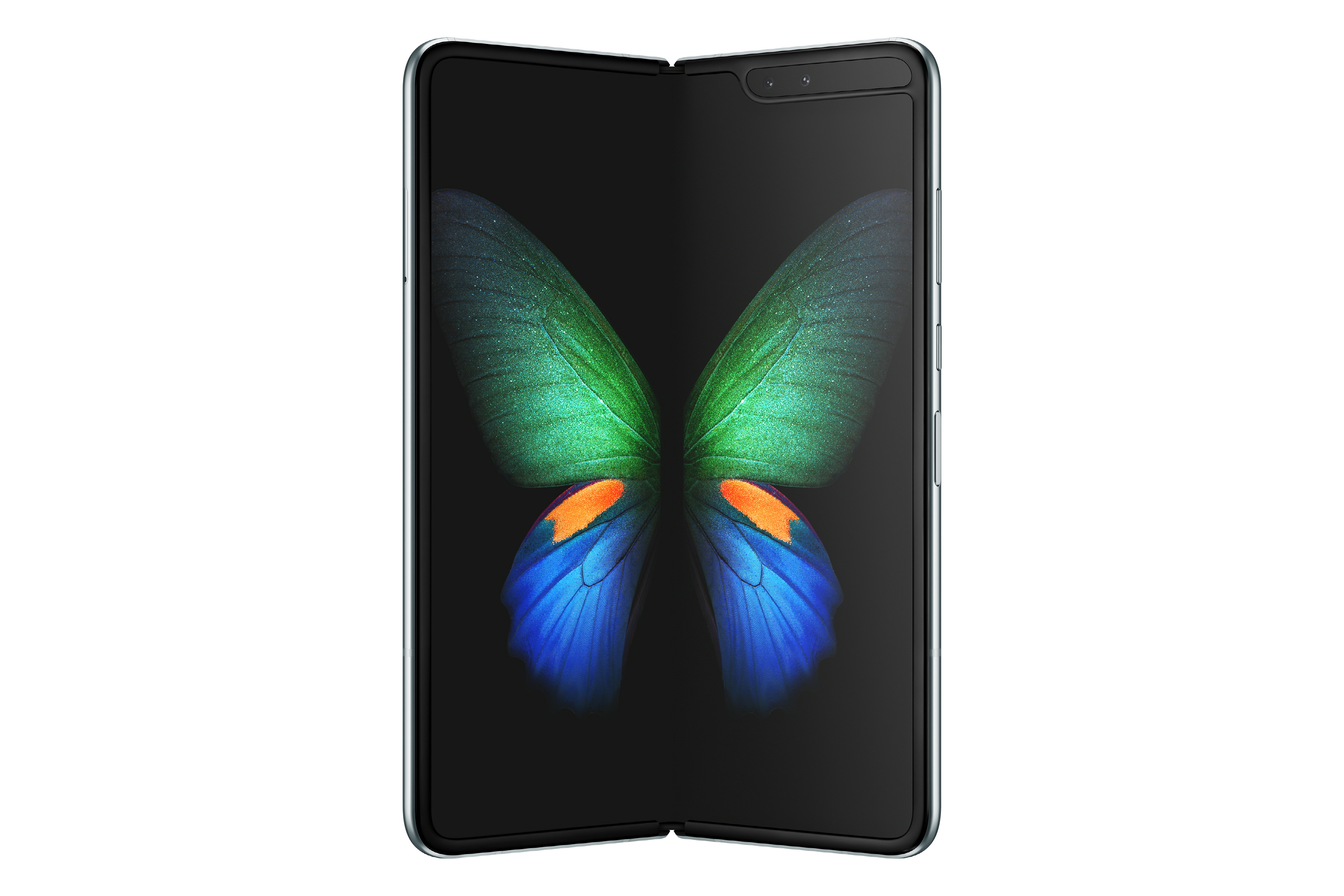
Photo: Samsung
Samsung is using brand new chips that haven’t been put through their paces yet, however, so they could surprise us. We’ll have to wait and see how they perform when the Galaxy S10 and its siblings reach early adopters next month.
No matter which of the six handsets you choose to spend your money on, though, you’re almost guaranteed great performance. Each one packs the fastest and most powerful hardware available today, plus ample RAM for mobile tasks.
Brilliant battery life
The latest iPhone lineup offers the best battery life we’ve ever had from Apple handsets. Apple says you’ll get around 12 hours of internet usage out of the iPhone XS, around 13 hours out of the XS Max, and 15 hours out of the XR.
The iPhone XR in particular has been wowing owners with its stamina in between charges. Few complain of having to charge the device before the end of the day, while some can get two days of use before having to top up.
It’s not yet clear how Samsung’s new handsets will compare. Samsung says you’ll get all-day battery life, and we don’t doubt it, but until its new devices are put through their paces in the real world, we can’t tell how they will actually perform.
The good news is that all six support fast charging and wireless charging. In fact, the Galaxy S10 wirelessly charges 36 percent faster than the Galaxy S9 — which was already faster than the iPhone — and it can wirelessly charge other devices.
Cracking cameras
The biggest smartphone manufacturers have been doing different things with their cameras in recent years.
Google’s Pixel 3 handsets are widely regarded as the best smartphone shooters, despite having just one camera lens. Apple has been shipping two inside its most expensive offerings for several years. Now Samsung is offering a third.
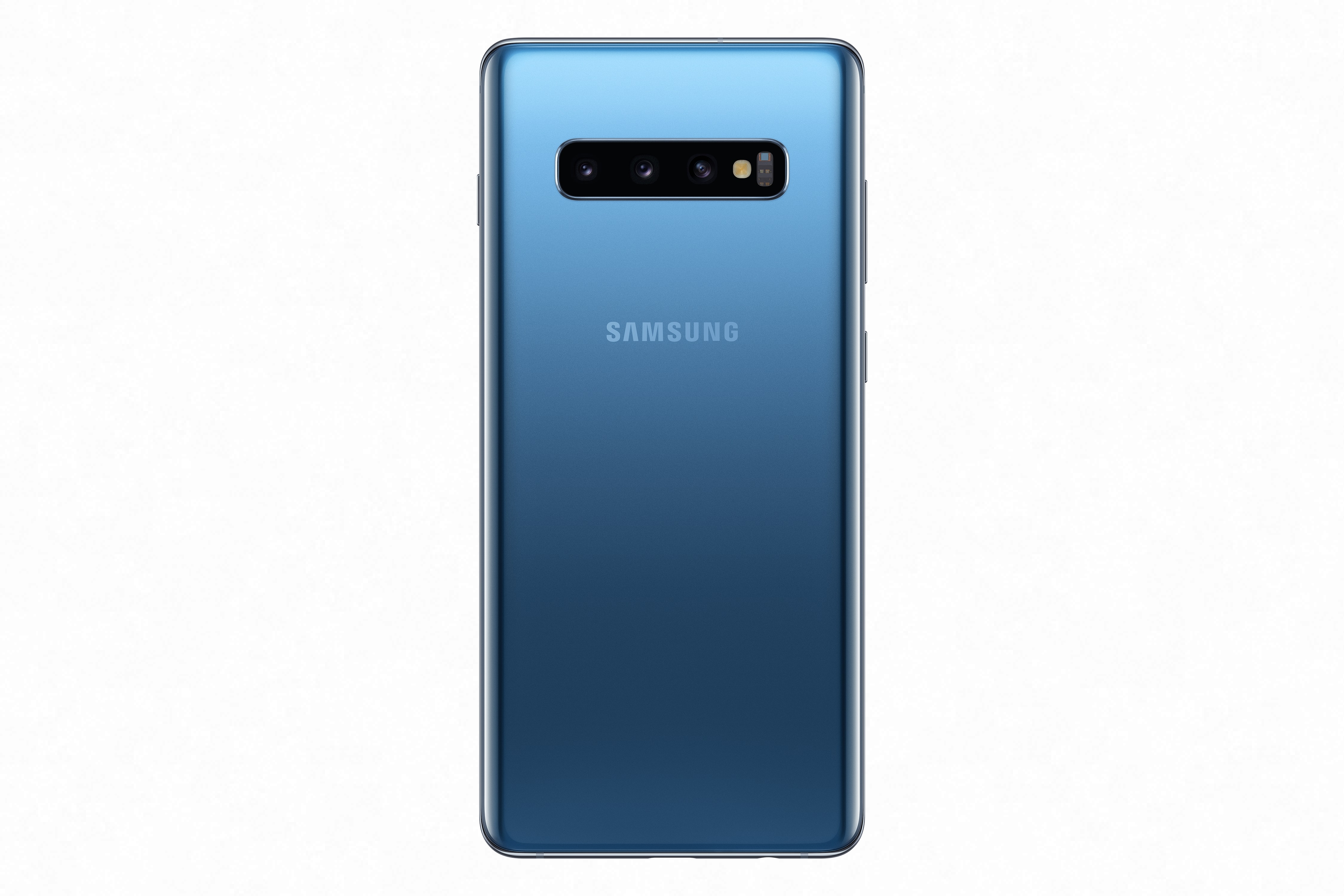
Photo: Samsung
The Galaxy S10 and Galaxy S10+ have triple camera systems that combine a 12-megapixel wide-angle lens for everyday shots, a 12-megapixel telephoto lens for 2x optical zoom, and a 16-megapixel ultra-wide lens for stunning landscape shots.
We’ll have to wait and see how these cameras perform, but Samsung is confident they will impress.
Stellar security
iPhone fans are used to Face ID now, and you’ll find very few who dislike it. It’s more convenient than Touch ID and a lot more secure, and in Apple’s most recent handsets, it’s even faster than it was in the iPhone X.
Samsung has opted not to copy Face ID, and instead offers the world’s first ultrasonic fingerprint scanner, which is embedded beneath the Galaxy S10’s display. To use it, you simply place your finger on the screen.
Samsung says this fingerprint scanner offers “vault-like security” that can’t be fooled by 2D or 3D replicas. But it has made similar claims about previous systems, like iris scanning, which turned out to be false.
Again, we’ll have to wait and see how the Galaxy S10 stacks up, but we’re confident Face ID will be hard to beat.
Unpopular prices
None of these handsets will suit shoppers on a tight budget. They’re some of the most expensive smartphones on the market today, so you’ll need to carefully consider which one is right for you before coughing up your cash.
Some do offer better value for money, however. The iPhone XR is almost considered a steal for Apple fans, delivering the same performance as the XS, even better battery life, and an arguably better camera for $749.
For the same money, you could get a Galaxy S10e with a second rear-facing camera, a sharper screen with HDR10+ support, two-way wireless charging, expandable storage, better water-resistance … the list goes on.
Then there’s the Galaxy S10, which, for $100 less than the iPhone XS, gives you a whole lot more. It still has a headphone jack, it has an even better screen, a third rear-facing camera, and all of the above.
What about the Galaxy Fold for $1,980? We wouldn’t recommend it.
